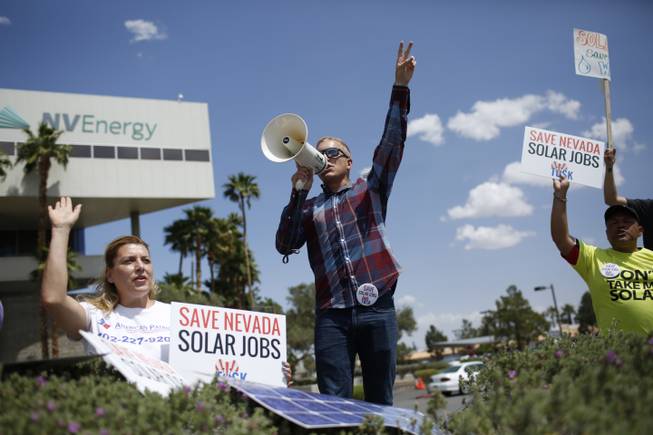
John Locher / AP
Michelle Balistreri and Chandler Gray attend a rally in front of NV Energy on Wednesday, April 22, 2015, in Las Vegas. Hundreds of activists gathered outside NV Energy headquarters in Las Vegas to protest a state cap affecting rooftop solar installations and urge the Legislature to lift it.
Monday, Feb. 20, 2017 | 2 a.m.
With legislation proposed last week, Nevada lawmakers will soon debate a number of energy-related issues, including the state’s renewable portfolio standards and efficiency programs. One of the bills would require that 80 percent of the state’s energy come from renewable power sources by 2040 (right now, the requirement is 25 percent by 2025).
The legislation sets two-year benchmarks for meeting the goal. For instance, in 2020 and 2021, providers would be required to get 30 percent of their energy from renewables. By 2030, the goal would be 50 percent, a standard that would match California’s goal.
A key word in this debate will be storage. Because solar and wind can be intermittent — the sun is not always shining, and the wind is not always blowing — those renewable sources often are backed up by a fossil fuel: natural gas. In the future, large-scale batteries that store renewables could replace natural gas. Many batteries currently are expensive, compared to cheap natural gas.
Here are more headlines from the energy world:
• END POINT: The Public Utilities Commission doubled down on a decision to deny NV Energy’s plans to acquire a 550-megawatt natural gas plant in Arizona. NV Energy had argued that the roughly $100 million South Point Energy Center was a steal, but the PUC’s 2-1 denial on Feb. 8 cited uncertainty surrounding the Energy Choice Initiative, which would end NV Energy’s monopoly on supplying power.
• NV ENERGY'S MOVE ON SOLAR: The utility is asking regulators to boost incentives for rooftop solar customers. Doing so, NV Energy argues, would make solar economically advantageous for customers. After controversial rates were imposed last year that changed the economic calculus for going solar, NV Energy received only 287 applications for new rooftop systems. That’s compared to a record 21,923 applications in 2015. Here’s what the utility wrote in a cover letter to regulators: “Increasing the incentive amounts will improve the economics of purchasing a rooftop solar system: New private solar generation customers subject to new net metering rules and rates established by the Public Utilities Commission of Nevada can expect a payback period of 20 years or less.” The short version: It could help restore the rooftop solar market.
• CONSIDERING 'POTENTIAL' CARBON?: In a bill pre-filed in November about long-term planning for electric utilities, the Governor’s Office of Energy proposed that the Public Utilities Commission of Nevada give preference to plans that: “Provide for diverse electricity supply portfolios and which reduce customer exposure to the price volatility of fossil fuels and the potential costs of carbon.”
• GOODBYE, COAL: Owners of the Navajo Generating Station in Page, Ariz., voted Feb. 13 to close the West’s largest coal plant when its lease ends in 2019. The plant’s owners — Arizona utilities, NV Energy and the U.S. Bureau of Reclamation — were considering a shutdown because coal was becoming increasingly less competitive as natural gas prices remain low.
• PRESENTING THE iSOLAR: In late January, NV Energy announced that Apple would purchase 200 MW for its Reno-based data from a new solar plant. On Feb. 2, NV Energy released the project details. The new solar plant, located in Boulder City, will churn out energy for as low as 3.1 cents per kilowatt-hour. That price-point for large-scale solar makes it competitive with natural gas and coal.
• SPEAKING OF ENERGY CHOICE: Gov. Brian Sandoval announced last week that Lt. Gov. Mark Hutchison would head the Governor’s Committee on Energy Choice, which Sandoval unveiled during his State of the State. The formation of the committee comes after voters overwhelmingly approved the Energy Choice Initiative, backed by Switch, Las Vegas Sands and Tesla. If approved by voters again in 2018, the initiative would create a competitive electricity market, allowing consumers to choose their energy provider. But the transition won’t be easy. NV Energy has remained neutral but has warned that the process could be costly and complicated.

Join the Discussion:
Check this out for a full explanation of our conversion to the LiveFyre commenting system and instructions on how to sign up for an account.
Full comments policy